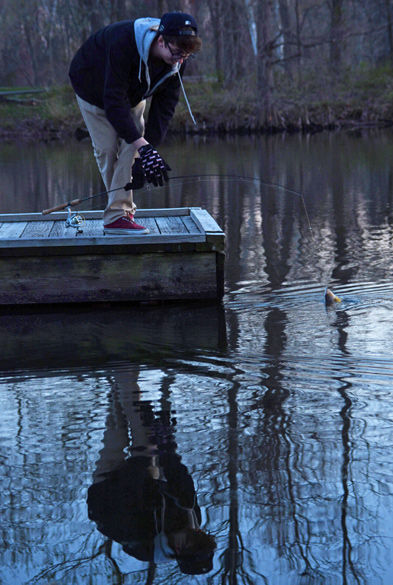Urban lakes unsafe in summer

April 16, 2014
Again this summer, scientists are advising people to not swim in Campus Lake or allow their dogs to drink from it.
Associate Professor Marjorie Brooks, who specializes in freshwater and marine biogeochemistry and aquatic ecology, said small animals should not drink out of urban lakes in the summer. Algal blooms grow in the hottest temperatures, and can, but do not always produce toxins.
“It can be – it’s not always – but it can be a harmful algal bloom… which we have here,” Brooks said. “So people shouldn’t let their dogs drink out of it. It’s not just Campus Lake, it’s pretty much any urban lake in the state.”
Advertisement
Brooks said she has heard of cases in which dogs have died from swimming in and consuming water from lakes with algal blooms. She said pregnant women should rarely eat fish from urban Illinois lakes during the summer months as well because the toxins can cause birth defects in their unborn child.
Associate Professor Gregory Whitledge, who specializes in fish ecology and fish management, said algal blooms are not only harmful, but are also unappealing.
“During the summer months, especially if we get a really hot summer, we get real thick blooms of algae out there that are unattractive and not very well used by the food chain,” Whitledge said.
Brooks said algae can be controlled by lowering the lake’s nutrients or by increasing the number of aquatic invertebrates, such as worms, which graze or eat the algae.
“How do you increase the amount of grazing if you want to do that? Well you have to get rid of the predators on the grazers,” she said. “The bluegills eat those aquatic invertebrates.”
Whitledge said to decrease algae several years ago, a graduate student of his removed roughly 15,000 bluegills from Campus Lake, some of which where moved to the horticulture pond near old Greek Row.
He said the six aerators in the 14- foot maximum depth lake also help improve the water quality.
Advertisement*
Brooks said over the last 15 years, the Illinois Environmental Protection Agency has given $350,000 to clean Campus Lake.
She said the lake’s major issue is the excessive nutrients in its water and a major source of these nutrients come from people who over-fertilize their lawns. She said the university does not fertilize campus lawns.
Whitledge said the problem with man-made lakes, like Campus Lake, which was built in the 1800s, is sediment washing in to them overtime.
“A lot of the water that goes into the lake enters it from culverts that are from storm drains that are collecting water that’s coming off of streets and parking lots,” he said.
While the lake has several water quality issues, the fish populations are robust, Whitledge said.
“It’s not a trophy fishery or anything but there’s some good populations of bass in there,” he said. “Bluegills have gotten larger in recent years so that’s good to see.”
Although some species are caught less, the fish are getting larger, according to data provided by Brooks on fish caught per hour from 2003 to 2011.
Only one of the 594 bluegills caught in 2004 met the preferred length of 7.8 inches, while almost all 59 bluegills caught in 2011 met the preferred length.
While the numbers have varied from year to year, the lake predominately consists of bluegill, largemouth bass, redear sunfish, warmouths and black crappies with several longear sunfish and yellow bullheads, according to the data. While rarely caught, the lake is also home to grass carp, bowfins, green sunfish, channel catfish and common carp, according to Brooks’ data.
Whitledge said a census of total fish has not been recorded in almost six years.
“If we assume the lake hasn’t changed much, there’s probably somewhere around 3,000 bass in the lake,” he said. “As for bluegill, there’s considerably more, it’s probably something like 30,000 or 40,000. But that’s just sort of a rough estimate.”
Chancellor Rita Cheng said she has consulted fisheries faculty about planting reed grasses in the old beach area to help with the water conditions.
“We’re working through some of the strategies Marjorie suggests that may make a difference based on the literature in reed grasses and things like that that could help to clean the water,” Cheng said.
Brooks said the old beach is going to be turned in to a wetland area.
Whitledge said he hopes Campus Lake has a thorough management plan someday.
“I’d love to see it turned into a long-term experiment,” Whitledge said.
Advertisement







